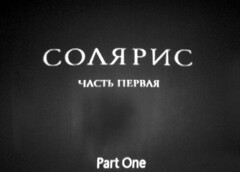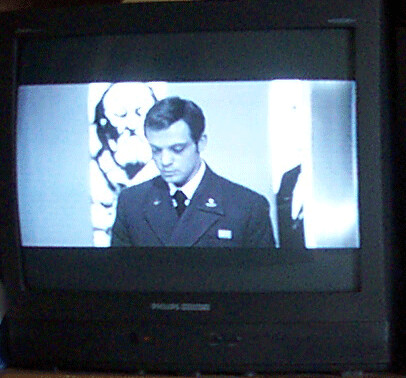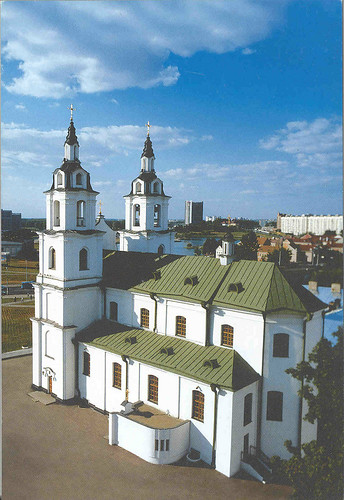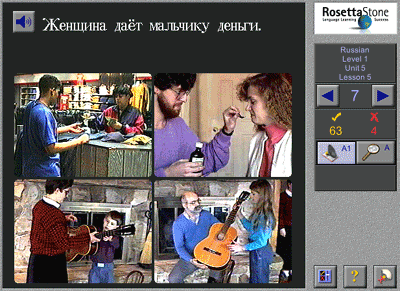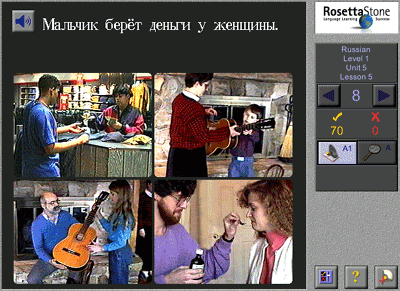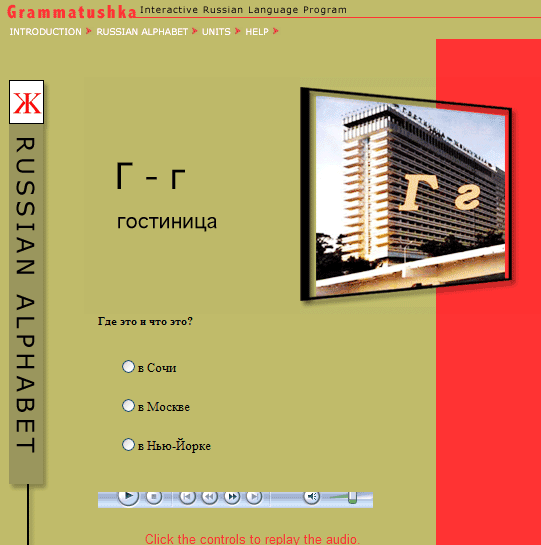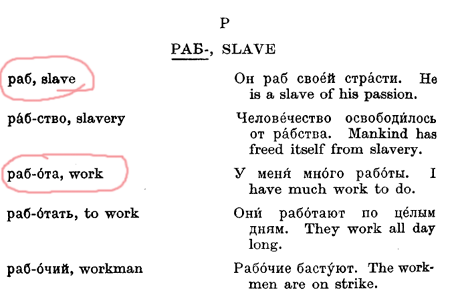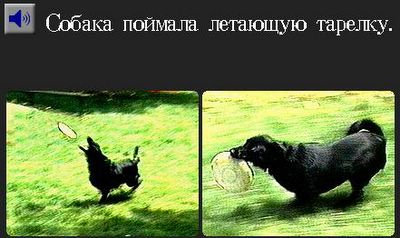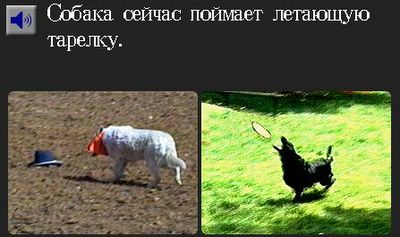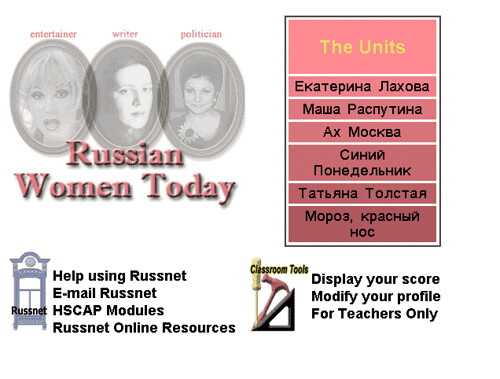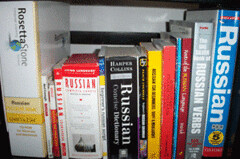| The acquisition of wh-questions in Russian | |
??
What??
??
This is a very bad combo.
I remember, several years ago before learning French, that this language sounded so intriguing, so fluid and so enticing. Today, I can no longer hear the "sound" of French and in some strange way, I wish that I could remember what it sounded like before I understood its meaning.
I was trying to explain this to some friends recently. That there is this one advantage of not understanding a language: to be able to hear its distinctive sounds and rhythms.
I do wonder what English sounds like. Does American English really sound like Charlie Brown's teacher? I have been told that it does, but it is difficult for me to imagine.
So I need to record a description of what Russian sounds like. Then, one day, several years from today, I can look back at the description and think back to the days when I couldn't understand it, but could appreciate its cadence.
Ok, so here is a description of what Russian sounds like to me:
vrya mnoi tye pritsa voi kya omanye bursh vastoi
What this tells to me is that Russian is very palatal and labial. I wonder if there is any research on what part of the vocal tract Russian takes the most advantage of.
Of course, I hear Russian with an English ear. So I notice the sounds that are very different from "my" sounds. Russian must sound different to a speaker of Vietnamese or Cherokee.
Evidently, I need to do some reading on Articulatory Phonetics.
Here's a helpful little site for understanding very basic Russian grammar. I especially like the tables of declined pronouns.
Although I have not been attending my Russian lessons as well as I would like, I have been giving them a lot of thought. I have realized that the Pimsleur tapes have given me a lot more usable vocabulary than the Rosetta Stone. I think that I have gained a more expansive vocabulary from Rosetta that will benefit me in the long run; for just getting around town when first arriving in a Russian city, Pimsleur wins hands down.
I will continue to use both because they both have advantages. I would be illiterate if I only used Pimsleur. If I only use Rosetta, I wouldn't be able to ask someone, "How are you?"
I have 501 Russian Verbs and The Big Silver Book of Russian Verbs. 501 I borrowed from the library and I bought Big Silver from amazon.
My first impression was to go with 501 because I had used 501 successfully with French, Spanish, and Italian. However, when I looked at the Russian 501, it had a lot less content than the Romance language ones. There are no examples.
I like the headings in the Big Silver book. They are big, bold and easier to read. Another big, bold thing is the TOP 50 VERBS marker on 50 of the 555 pages. I am not sure how they chose the TOP 50 VERBS, but it does get your attention. I don't really care for the serif font used for the main text.
I am glad that I bought the Big Silver book, mostly because it gives lots of examples and usage instructions.
I read an interesting article from the Kommersant on the fact that rich Russians are having bilingual nannies raise their children with Western European culture and language. Based on the tome of the article, it seems that rich Russians are not as concerned with the benefits of educating children to be bilingual, but rather, educating them to be more Western European.
For me this brings to mind the historical exaggeration of Catherine the Great's tour of the Potemkin Villages. Do Russians see their land and cultural as something to be hidden?
At this time, Russian are having serious problems with terroism. Perhaps these terrorist attacks are causing them to reject their national heritage.
Today a friend asked me how my Russian learning is progressing.
Moderately.
After thinking about her question, I decided that classroom L2 aquisition has a low progress rate for me. By comparison I think that I am progressing faster on my own.
I wonder if anyone else has opinions on whether it is faster or easier to learn on your own rather than in a classroom.
Most everyone will respond that the fastest way to learn is by immersion. I'd agree that immersion has a high progress rate. But if immersion is not an option, then what's the next best choice?
Microsoft Word has a very easy to use translation tool. It's powered by WorldLingo and is found in Tools... Language... Translate. It gives a quick machine translation.
The good thing about typing a Russian phrase or sentence into Word is that it will spellcheck and grammar check it. This is really helpful for me because I have a tendency to mistype words that I type into a web translator.

So, I've recently started using RSSOwl, and I think it's great. I have
several searches from Technorati that I read daily on RSSOwl that should
keep me informed of the goings-on in Russia and all things Russian. However,
I am actually being incessantly informed of Russian women who are possibly
my soulmates and brides:
Belarussian bride dating agency with a comprehensive list of Russian women.
Russian True Love Agency - *****'s homepage (km9131, 49 yrs old 160 cm )
Date of birth: the 16th of November, 1955 Weight: 60 kg ~ 132 lb Eye
color...: German: Level 5, Fluent language ability, no translations
needed...
I simply don't understand who would be using this source of wife-picking. Is
that what normal people are doing on Russian websites? I don't need a bride,
much less a Russian one. Is that abnormal?
Honestly, I thought one of the purposes of a newsreader was to protect the
reader from pop-ups, ads, spam, and other intrusions while still receiving
up-to-date content. I feel so disillusioned.
разочарованность.
I know that many of you have been scouring the web looking for an answer to
my questions: how to learn the Russian alphabet? is there an alphabet song?
how will I ever find anything in the translation dictionary if I don't know
alphabetical order?
Well, never fear, I have found a solution to my alphabet problem: Alphabet
letter-by-letter .
It's an exe file that plays the alphabet for you with audio and visual. It's
just right for me.
So thanks to all of you who have been helping me with my Russian alphabet
quest. I've luckily answered my own question.
I'm taking an allergy test today. So I looked up the word for "allergy" and it turns out to be a cognate. That's a pleasant surprise. The other good thing about this allergy test is that I'm not allowed to go to the gym during the test. Therefore for this entire week, I will have more free time to work on my Russian studies.
Today I'm listening to Русское Международное Радио and the music is not too bad. I can only understand about 1 word in 50, but that's better than none.
My Rosetta Stone lesson today (1-4-7) was about families. Mother, father, daughter, son, parents. I wonder if Russian has lots of words for extended family, or if everyone is actually called a "cousin." What about a step-father-in-law? I wonder. The Russian word for brother is a very funny false cognate: брат.
I found this book at the public library and I couldn't resist checking it out. I have never read the book in English.
After checking it out, I realized that I wouldn't be able to understand a word without a little help. Therefore I decided to check out the original text. Unfortunately, I couldn't find it; it was probably checked out. I did, however, find the French translation, Harry Potter à l'école des sorciers which works for me... I thought. Now I'm not so sure. Since these are both translations, it will be difficult to understand what the orginial text said. For example, the translated titles literally mean in English:
Гарри Поттер и философский камень - Harry Potter and the Philosopher's Stone
Harry Potter à l'école des sorciers - Harry Potter at the Sorcerer's School
After reading kangmi's post on daily goals, I've decided to update mine. In my first post, I listed several goals:
- study about 2 hours a day:
- One hour will be spent with the Rosetta Stone software
- Second hour will be spent studying my grammar book, a Russian website, my audio cassettes.
- I will be making flashcards of new vocabulary words to study at dull moments during the day.
These initially goals were well-intended, but after 3 months, I realize that I cannot meet them on a daily basis. I like kangmi's very detailed list of goals. Here is my revised list: - Pimsleur at least once every other day.
- Rosetta Stone for 30 minutes/day.
- Review 1 flashcard per day.
- Listen/watch Russian media 2 times/week.
- Grammar book lesson 2 times/week.
- Blog once every other day.
This is basically the same content as my initial list, but I think the intervals and length of time are more realistic. And one more further challenge to myself... if/whenever I meet a Russian-speaking person, I will make an honest attempt to speak a little Russian. This is the most difficult part for me because I am always too shy to give it a shot, fearing that I will make a hideous mistake. I need to get over it! I am a beginning student and I don't claim to be more. I should put my pride in my pocket and shout out my best Здравствуйте!
Avoir les jambes en coton: Interesting blog entry about translation of a Russian idiomatic expression into French then into English.
Yesterday I purchased The Big Silver Book of Russian Verbs (Big Books) by Jack Franke. I saw that it had three good reader comments on amazon. Generally I use the Barron's Education Series 501 verb books, but based on amazon's customer reviews, I decided to go with the Big Silver Book.
Today I went to the library and borrowed the Barron's verb book so that I can compare the two. When I have formed an opinion, I'll let you know.
Also, at the suggestion of TJ, I have borrowed two Russian movies from the public library: War and Peace (1967) and Tycoon a new russian (2002). I doubt that I will be able to understand a word, but I will give it a try. The War and Peace film is in 4 parts on 3 DVDs. It will keep me busy all week.
Today I listen to 30 minutes of the Oxford Take Off in Russian cassette. It started with the alphabet, so I guess that I could keep listen to the first part of the tape to learn the alphabet. The thing that I noticed about this tape is that the speakers speak A LOT slower than the speakers on Pimsleur and Rosetta Stone. I was pleased to discover that I recognized most of the vocabulary used during that first 30 minutes. With this Take Off in Russian program, the narrator directs you to refer to the text or to do some exercises before continuing with the audio lessons. But of course, I didn't because I was at the gym. I did just fine without the book. I'll take a look at the book this evening and do the lessons I missed. Another interesting thing was that they conjugated verbs out loud. These tapes are a nice supplement to the other materials that I am using, but I do not think that it would be a great audio method of learning Russian.
I did Lesson 7 of Pimsleur. It didn't seem to introduce very many new vocabulary words (which was a relief).
OK, now I need to do a grammar lesson and my Take Off in Russian exercies.
Pimsleur says that this has a masculine pronunciation and a feminine pronunciation, but I cannot really hear the difference. So, I have been searching the web for the phrase "Я хотел бы" in order to see if I can find the difference in writing. And today I found it at LearningRussian.com.
Я хотел бы подстричь волосы.
Я хотела бы подстричь волосы.
That makes a lot more sense!
Rosetta Stone lesson 1-4-6 is all about action verbs. It also shows several declinations besides nominative. I guess this means that I will have to start studying my grammar book.
Does anyone have any suggestions of how I can learn alphabetical order in Russian? I am having trouble using the dictionary because I don't know the exact order of the letters; I can't seem to memorize the alphabet. I have looked around on the Internet for a recording of an Russian alphabet song, but I can't find one.
I also need to learn how to type faster in Russian. I'll keep working at it.
I think that Rosetta Stone works even better if you repeat after the speaker.
This evening I decided to have a look through the little Berlitz Russian for Travellers phrase book that I have had for a long time.
I bought this book when I was 13. I have always been interested in languages, ever since I can remember. When I was 13, I decided that I wanted to learn Russian. At the time, everything Soviet seemed very exotic to me. It was the end of the Cold War and even the Cyrillic alphabet appeared forbidding and foreboding... just what a 13 year old would be interested in.
I grew up in a small town in Alabama. We had one library and one bookstore as I recall. I couldn't find anything Russian at the community library, but I did find this small Berlitz phrase book at the bookstore. So I bought it with my allowance and I had every intention of learning Russian using this little book. I don't exactly remember if it came with a cassette- I imagine that it would have- but I don't have any recollection of it.
Needless to say, this little phrase book didn't help me learn Russian. But I never lost my interest in learning the language. I was interested in learning the language that Tchaikovsky knew. As a piano student, I became familiar with the works of great Russian composers. Later, I discovered Tolstoy and Dovstoyevski. When I was 15, my mom took me to Memphis to see the Catherine the Great exhibition. I was enthralled.
The same year that I bought this Russian phrase book, there was an article in our local newspaper about an organization called Peace Links. The article said that Peace Links was "campaigning" to connect American and Soviet penpals. So, as directed, I wrote a letter to Betty Bumpers in Washington, DC with a short description of myself and a request to receive a Soviet penpal. Less than a month later, a letter arrived from Washington. When I opened the envelope, there was a red-blue striped AirMail envelope inside that had already been opened. The AirMail envelope was addressed to Betty Bumpers in Washington, DC. Its letter was from a girl named Natasha. She had also written a short description of herself. She was 3 months older than me and lived in Minsk, Belarussia, USSR.
I was reminded of all these things by glancing through this Berlitz Russian phrase book. I am so glad that I kept it. It has all sorts of "helpful" tips for traveling in the USSR. For example,
Hairdresser's -- Barber's
In the Soviet Union, women often work as barbers. Men's hair styles vary greatly in the USSR, but shoulder-length hair is still considered a bit foreign.
from page 121, the yellow Shopping Guide section. This book is definitely a keeper.
Catherine the Great Exhibition in Memphis, 1991
I have repeated Unit 6 of Pimsleur. I think that I have done this unit 2 or 3 times so far... it feels like a really difficult lesson. However, I feel that I will be ready to move on to Unit 7 tomorrow.
I haven't posted anything in weeks. I feel terrible about it. I haven't been very good at keeping up with my lessons these past two weeks either. I did do one RS lesson last week, but no Pimsleur. I'll do it tonight, I promise. It's not that I have lost my motivation, but I can't find the energy to do it.
Yesterday an American guy asked me, "Вы говорите по-русски?" It was a turning point in my life. Until that moment, I had never heard an American speak Russian with a thick American accent. I am now very resolved to work diligently on my pronounciation and on ensuring that I articulate each syllable.
And also... I am starting to see overlapping vocabulary in Rosetta Stone and Pimsleur. It's great when I encounter a word that I already know!
So I did my Pimsleur at the gym. Pro: now I have time to do my Rosetta Stone at home in the evening. Con: I feel like a big dork and I can't hear my voice very well because of all the gym noise.
I can't believe how much new vocab Pimsleur introduces in each lesson. Can anyone learn it in just one listen? It says that you can repeat the lesson during the day until you have it about 80% down pat. It takes me about two times to get it about 80%.
I am still translating my email vocab. "Spam" is a cognate!
If only I could fit in my flash card time.
I have decided that this has to be an obsession in order to get it learned in a decent amount of time. In that book, Learn Any Language, the guy talks about learning several languages at one time. I can't understand how you would have enough time and brain power to accomplish that unless it was your full-time occupation. In that link below where the guy describes his progression to French fluency, it seems that it was an all-encomposing endeavor for one year. I saw another website where the guy says that it takes two strong years of learning to reach fleuncy in Russian. I can't imagine being able to achieve a true conversational fluency in two years. Maybe I could do it if I were studying it each day and living in a Russian speaking country.
I have become totally obsessed with my Russian lessons. I think about them all day!
I started Pimsleur lesson 6, then realized that I was way out of my league, so I repeated lesson 5. (The lesson that I had completed while folding the laundry. Hmmm.... maybe I CAN'T fold laundry and do Pimsleur at the same time.)
I have printed out my russian email Inbox and Compose new mail screens so that I can translate all the words on the pages. I thought that I had been sending new mail all this time, but it turns out that all my messages were in my Drafts folder. Oops. It makes a difference which button you click!
I am going to bring my Pimsleur cassette to the gym tomorrow with my walkman (I feel so '80s) and headphones. I will have to deal with people staring at me and thinking that I have escaped from the Looney-house because I am exercising and talking aloud to myself in Russian: "где - Красная площадь? Красная площадь - там. Не хотите ли вы что-нибудь поесть? нет. Я хотел бы что-нибудь попить."
Can I handle the embarassment?
Wow, there was a lot of new vocabulary in this lesson. I need to try to repeat it, but I don't know if I will have time in the next 24 hours to do so. I feel like I need to go on with the next lesson. It would be really convenient if I could do these lessons at the gym. My mind wanders will I am there on the eliptical machine anyway, I might as well take advantage of the brain's down time and do a lesson. Do I have the courage to talk out loud to myself in Russian at the gym? Hmmm. That's a tough one. I don't think that the lessons will work unless you say everything out loud. I will have to give it some thought. I could kill two birds with one stone, then still have time at night to do the Rosetta Stone lesson.
Why do I feel so pushed for time? I spent a lot of time this past weekend just surfing, so why can't I be more productive with my Russian lessons?
I think that I forgot to mention that I recently bought a second Russian translation dictionary. This one is for my office so that I have one at home and one at work. This one is a Pocket Oxford Russian Dictionary and my other one is a Harper-Collins. I wonder which one I will like better and what the differences are.
My Pimsleur cassettes are due back to the library on Saturday. It is stupid that it is a 30-lesson pack, but they only give you 14 days to check it out.

Rosetta Stone Level 1 Unit 4 Lesson 1
Well, I haven't done the Rosetta Stone in over a week, so I had expected to have forgotten a lot since that is what usually happens when I stop doing it for a day. Surprisingly, I haven't really forgotten much! It must be because I have been working on the Pimsleur each day.
And because I have been working on the Pimsleur lately, I cannot resist repeating after the Rosetta Stone speaker even though I am practicing the reading and listening lessons.

You wouldn't believe how many times I had to call in to AudioBlogger to get this recorded. I kept accidentally pressing the pound key and hanging up. My cellphone is not convenient for recording my Pimsleur lessons by phone!
I can multitask at the office. I learned today, however, that I cannot multitask with Pimsleur during lunch. My phone was ringing, people were coming in my closed-door office, my email was dinging, I could hear people in the hallway talking. I had the attention span of a gnat.
I did realize that some of the vocabulary in the Pimsleur is now starting to overlap with the vocabulary that I have been learning in Rosetta Stone. To recognize some words immediately was great!
this evening named Yuri. He is someone that I will probably have to communicate with every now and again. I was not impressed. He was arrogant and tried to tell me that I should be doing things his way. He also wouldn't shake my acquaintance's hand because she's a woman. I didn't even bother trying to shake his because he conveniently held a drink in his hand the whole time I spoke to him. I told him that I had started studying Russian recently and he asked me to say something in Russian. So I jokingly told him до свидания! (bye!) and he starts in with, "Is that all you know? You aren't studying Russian! Is that it? Everybody knows до свидания!" OK, so the humor thing needs some work. I still think he's a jerk.
Today I was reminded of how much concentration the Pimsleur method takes. I was having trouble concentrating, and any time that I lost my concentration for even 5 seconds, I was lost! Today's lesson seemed mostly like a review, but we did learn some masculine/feminine adjective differences.
I still haven't made the time for Rosetta Stone. I have great intentions....
Today I completed Pimsleur lesson 2. I was relieved to discover that the first half of the lesson was a repeat of lesson 1. After reviewing lesson 1, they moved on to introduce a little bit more vocabulary that fit in with the words that I had already learned. At the end of the lesson, the speaker asks you questions and you have to answer them truthfully... and believe it or not, I did it correctly! Wow, that's instant results.
I also figured out today that the Instant Conversation version of Pimsleur is the same as the first ten lessons of the Comprehensive Level 1. The entire comprehensive level has 30 lessons and two readings.
I am going to try to do some Rosetta Stone before going to bed tonight.
I am still doing very badly about reviewing my flash cards. I can't seem to find time to do it. Am I that busy? It doesn't seem like I should be, but by the end of the day, I never seem to have time. I think that I need to make some time for myself so that I can get that task accomplished.
Входящие = Inbox
удалить = Delete
I forgot to mention that I have put Cyrillic keyboard stickers on my keyboard. Now I don't have to guess about which letters are where. My Russian typing is a little quicker than when I first started. I guess that I will have to learn to spell better before I can type much faster.
Russify Your Computer
Today I have gone through the Pimsleur Lesson 1 from the Instant Conversation package. I was surprised at how much concentration it takes to go through the lesson. I was thinking that I could record the lessons on a MP3 player and do them at the gym, but after doing this first lesson, I no longer think that will be possible. It takes too much concentration. I can hardly fold the laundry and do the lesson at the same time. I am curious to see if I can remember any of what I am learning in two or three months. People do attest to this method, so we will see. I am including an audio clip of a few seconds of my lesson.
I went to the public library yesterday to check out the Pimsleur Russian CDs. It turns out that someone has had the 10 disc set checked out for 7 months! Thief! Since the CDs weren't available, I checked out the cassettes for Comprehensive level 1. I only have one cassette player, so I am limited with where I can listen to it, but I suppose that's OK.
One of my colleagues has recently met someone who is a native speaker of a language other than English. I know you are asking yourself, "Can this be possible? Someone who does not speak English natively?" Well, on very rare occasions, it can happen.
At any rate, my colleague is very excited about it. He plans to take advantage of this chance meeting by learning his new friend's language by communicating through email. It's a very good idea. I suggested to him that he should write in English and his friend should write in respective native language. In this way you see the foreign language as it should be. I believe that he is not taking my well-intentioned advice because he plans to try to write in his second language and accompany it with the English translation.
Translation is not the goal of second language acquisition. Fluency is the goal. Fluency means comprehension without translation.
So, if he would not take my (educated) advice, then I decided that I should take it myself. Therefore I have set up a new email account from a Russian mail server. This way, I have to learn how to navigate a web-based email account in Russian. Just to set up the account with my username, password, mother's maiden name, birthday, etc. was much more difficult than I had imagined it would be! I will use my new Russian email account for this blog. One of the first things that I have learned from this experience is what the OK and Cancel buttons look like in Russian:

And here is Current Password: Текущий пароль
I also have a friend who is a native speaker of Russian, so I will ask her to write me a few lines in Russian so that I can learn some email-speak in Russian.
Over the Christmas holiday, I have reviewed all of Unit 3 in Rosetta Stone. I did fine on the review, but I don't feel like I am really retaining all of the vocabulary as I should. While I move on to Unit 4, I know that I really need to review my flash cards, seriously.
I also plan to visit the public library this weekend and check out the Pimsleur Russian CDs. If they look like a good learning tool, then I will buy the full sets.
|



